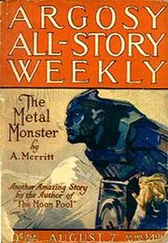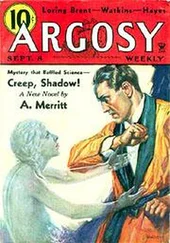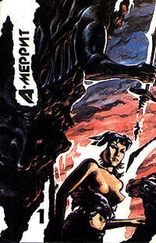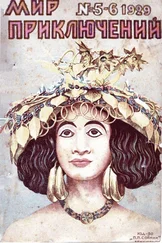He went out. I felt as though I'd been given the accolade.
I dropped a brief note to Bill, simply saying that when one had made up one's mind to do something, there was no time like the present and that therefore I was making myself one of the de Keradel menage on the morrow. I didn't say anything about the Demoiselle's telegram, leaving him to think I was on my way solely of my own volition. I told him McCann had a message that was damned important, and that if and when he received it from me to forward it quick, according to directions.
I wrote a little letter to Helen…
The next morning I left the Club early – before the letters could be delivered. I taxied leisurely to Larchmont; arrived at the Club shortly before noon and was told that a boat from the Brittis was awaiting me at the landing stage. I went down to the boat. There were three men on it – Bretons or Basques, I couldn't tell which, oddly enough. Rather queer looking – stolid faces, the pupils of their eyes unusually dilated, skins sallow. One turned his eyes up to me and asked, tonelessly, in French:
"The Sieur de Carnac?"
I answered, impatiently: "Dr. Caranac." And took my place in the stern.
He turned to the two: "The Sieur de Carnac. Go."
We shot through a school of small fry and headed for a slim gray yacht. I asked: "The Brittis?" The helmsman nodded. She was a sweet craft, about a hundred and fifty feet over all, schooner rigged and built for speed. I doubted McCann's estimate of her ocean-going capabilities.
The Demoiselle was standing at the head of the ladder. Considering the manner of my last parting with her, there were obvious elements of embarrassment in this meeting. I had given them considerable thought and had decided to ignore them, or pass them over lightly – if she would let me. It was no picture of a romantic hero I had made sliding down from her tower, and I was still somewhat sensitive as to its undignified aspects. I hoped her arts, infernal or otherwise, hadn't enabled her to reconstruct that spectacle. So when I had climbed the ladder, I simply said with cheerful idiocy:
"Hello, Dahut. You're looking beautiful."
And so she was. Nothing at all like the Dahut of ancient Ys; nothing at all like a shadow queen; nothing at all like a witch. She had on a snappy white sport suit, and there was no aureole, evil or otherwise, about her pale gold hair. Instead there was a tricky little green knit hat. Her great violet eyes were clear and ingenuous with not a trace of the orchid hell sparks. In fact, to outward appearance only an extraordinarily beautiful woman with no more high explosive about her than any beautiful woman would naturally carry. But I knew different, and something whispered to me to be doubly on my guard.
She laughed, and held out her hand: "Welcome, Alain."
She glanced at my two bags with a small enigmatic smile, and led me down to a luxurious little cabin. She said, matter-of-factly: "I'll wait for you on deck. Don't be long. Lunch is ready." And she was gone.
The yacht was already under way. I looked out of the port and was surprised to see how far we were from the Club. The Brittis was speedier than I had surmised. In a few minutes I went up on deck and joined the Demoiselle. She was talking to the captain whom she introduced to me by the good old Breton name of Braz; and me to him as the "Sieur de Carnac." The captain was of stockier build than the others I had seen, but with the same stolid expression and the same abnormally dilated eyes. I saw the pupils of his eyes suddenly contract, like a cat's, and a curiously speculative gleam come into them… almost as though it were recognition.
I knew then that what I had taken for stolidity was not that at all. It was withdrawal. This man's consciousness lived in a world of its own, his actions and responses to the outer world instinctive only. For some reason that consciousness had looked out from its inner world into this under the spur of the ancient name. From its own world… or from another's into which it had been sent? And were the other men upon this boat under that same strange duress?
I said: "But Captain Braz, I prefer to be called Dr. Caranac – not the Sieur de Carnac." I watched him closely. He did not respond, his face impassive, his eyes wide and blank. It was as though he had not heard me.
The Demoiselle said: "The Lord of Carnac will make many voyages with us."
He bent and kissed my hand; he answered, tonelessly as had the boatman: "The Lord of Carnac does me great honor."
He bent to the Demoiselle and walked away. I watched him, and felt a creep along my spine. It was exactly as though an automaton had spoken; an automaton of flesh and blood who had seen me not as I was but as someone else had bidden him.
The Demoiselle was regarding me with frank amusement. I said, indifferently: "You have perfect discipline, Dahut."
Again she laughed: "Perfect, Alain. Let us go to lunch."
We went to lunch. That, too, was perfect. Somewhat too perfect. The two stewards who served us were like the others I had seen; and they served us on bent knees. The Demoiselle was a perfect hostess. We talked of this and that… and steadily I forgot what she probably was, and thought of her as what she seemed to be. Only toward the last did that which was buried deep in both our minds crop out. The blank-eyed stewards had knelt, and gone. I said, half to myself:
"Here feudal and the modern meet."
She answered, quietly: "As they do in me. But you are too conservative in naming feudal times, Alain. My servants go further back than that. As do I."
I said nothing. She held her wine glass against the light, turned it to catch the colors, and added, casually:
"As do you!"
I lifted my own glass, and touched hers with its rim: "To ancient Ys? If so, I drink to it."
She answered gravely: "To ancient Ys… and we drink to It."
We touched glasses again, and drank. She set down her glass and looked at me, faint mockery in her eyes and, when she spoke, within her voice:
"Is it not like a honeymoon, Alain?"
I said, coldly: "If so – it would be somewhat lacking in novelty – would it not?"
She flushed a little at that. She said: "You are rather brutal, Alain."
I said: "I might feel more a bridegroom if I felt less like a prisoner."
Her straight brows drew together, and for a moment the hell sparks danced in her eyes. She dropped her eyes and said, demurely, although the angry flush still stained her cheeks:
"But you are so elusive, my beloved. You have such a gift for disappearance. There was nothing for you to fear that night. You had seen what I had willed you to see, done as I had willed – why did you run away?"
That stung; the sleeping wrath and hate against her that I had known since I met her flared up; I caught her wrists:
"Not because I feared you, white witch. I could have strangled you while you slept."
She asked, tranquilly, and tiny dimples showed beside her lips:
"Why didn't you?"
I dropped her hands: "I may still. That was a wonderful picture you painted in my sleeping mind."
She stared at me, incredulously: "You mean… you do not think it was real? That Ys was not real?"
"No more real, Dahut, than the world in which the minds of the men on this boat live. At your command – or your father's."
She said, somberly: "Then I must convince you of its reality."
I said, rage still hot within me: "Nor more real than your shadows, Dahut."
She said, yet more somberly: "Then of those, too, you must be convinced."
The moment I had said that about the shadows I was sorry for it. Her reply did nothing to reassure me. I cursed myself. This was no way to play the game. There was no advantage to be gained by quarreling with the Demoiselle. It might, indeed, bring down upon those I was trying to protect precisely what I was trying to save them from. Was that the meaning behind her promise to convince me? She was pledged so far as Bill was concerned and here I was in payment – but she had made no pledges as to Helen.
Читать дальше
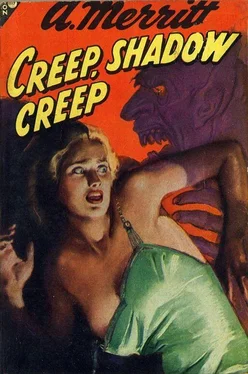
![Абрахам Меррит - Лунный бассейн [Лунная заводь]](/books/20623/abraham-merrit-lunnyj-bassejn-lunnaya-zavod-thumb.webp)

